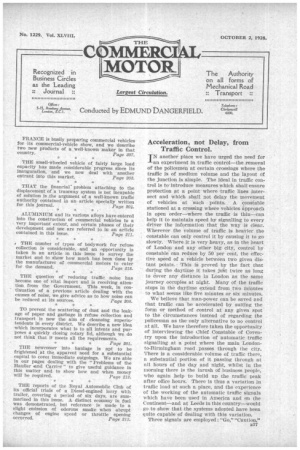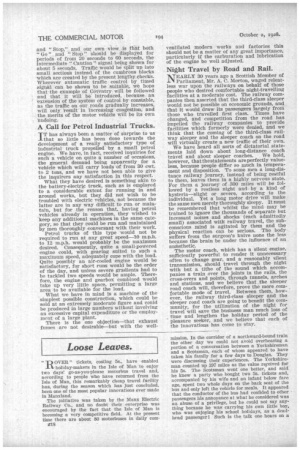Acceleration, not Delay, from Traffic Control.
Page 1

Page 2

If you've noticed an error in this article please click here to report it so we can fix it.
IN another place we have urged the need for an experiment in traffic control—the removal of the policemen at certain crossings where the traffic is of medium volume and the layout of the junction is simple. The ideal in traffic con trol is to introduce measures which shall' ensure protection at a point where -traffic lines intersect and which shall not delay the movement of vehicles at such .points. A constable stationed at a crossing where vehicles approach in open order—where the traffic is thin—can help it to maintain speed by signalling to every driver the information that the way is clear. Wherever the volume of traffic is heavier the constable can only control it by causing it to go slowly. Where it is very heavy, as in the heart of London and any other big city, control by constable can reduce by 50 per cent, the effec tive speed of a vehicle between two given distant points. This ie proved by the fact that during the daytime it takes jtfet twice as long to cover any distance in London as the same journey occupies at night. Many of the traffic stops in the daytime extend from two minutes to what seems like five minutes or six minutes. We believe that than-power can be saved and that traffic can 'be accelerated by suiting the form or method of control at any given spot to the circumstances instead of regarding the policeman as the onlyalternative to no control at all. We have therefore taken the opportunity of interviewing the Chief Constable of Coventry upon the introduction of automatic traffic signalling at a point where the main London to-Birmingham road . passes through the city. There is a considerable volume of traffic there, a substantial portion of it passing through at all hours of the day and night, whilst in the morning there is the inrush of business people, who again help to build up the traffic peak after office hours.' There is thus a variation in traffic load at such a place, and the experience of the working of the automatic traffic signals which have been used in America and on the Continent—and at Leeds in this country—would go to show that the systems adopted have been quite capable of dealing with this variation.
Three signals are employed : "Go," "Caution," and "Stop," and our own view, is that both " Go ". and " Stop " should be displayed for periods of from 20 seconds to 60 seconds, the intermediate "Caution " signal being shown for about 5 seconds. Traffic would be split up into small section's instead of the cumbrous blocks which are created by the present lengthy checks. Wherever automatic traffic control by timed signkl can be shown to be suitable, we hope that the example of Coventry will be followed and that it will be introduced, because an extension of the system of control by constable, as the traffic on our roads gradually increases, will only t esult in increasing congestion, and the merits of the motor vehicle will be its own undoing.
A call for Petrol Industrial Trucks.
TT has always been a matter of surprise to us 1-that so little has been done towards the development of a really satisfactory type of industrial truck propelled by a small petrol engine. We have, in fact, received inquiries for such a vehicle on quite a number of occasions, the general demand being apparently for a vehicle which will carry loads of from 30 cwt. to 2 tons, and we have not been able to give the inquirers any satisfaction in this respect.
What they have desired is something akin to the battery-electric truck, such as is employed to a considerable extent for running in and around works, but they did not wish to be troubled with electric vehicles, not because the latter are in any way difficult to run or maintain, but for the reason that, having petrol vehicles already in operation, they wished to keep any additional machines in the same category, so that they could be run and maintained by men thoroughly conversant with their work.
Petrol trucks of this type would not be required to run at any great speed-10 m.p.h. to 12 m.p.h. would probably be the maximum desired. Consequently, quite a small-powered engine could, with gearing suited to such a maximum speed, adequately cope with the load. Quite possibly an air-cooled engine would be satisfactory, for short runs would be the order of the day, and unless severe gradients had to be tackled two speeds would be ample. Therefore, the engine and gearbox combined would take up very little space, permitting a large area to be available for the load.
What we have in mind is a machine of the simplest possible construction, which could be sold at an extremely moderate figure and could be produced in large numbers without involving an excessive capital expenditure or the employment of a large plant.
There is the one objection—that exhaust fumes are not desirable—but with the well
ventilated modern works and factories this should not be a matter of any great importance, particularly if the carburation and lubrication of the engine be well adjusted.
Night Travel by Road and Rail.
NEARLY 30 years ago a Scottish Member of Parliament, Mr. A. C. Morton, waged relentless war upon the railways on behalf of those peoplewho desired comfortable night-travelling facilities at a moderate cost. The railway companies then asserted that the third-class sleeper would not be possible on economic grounds, and that it would draw its passengers largely from those who travelled first class. Times have changed, and competition from the road has Impelled the railway companies to provide facilities which formerly were denied, and we think that the coming of the third-class railway sleeper and the sleeper coach on the road will virtually create a new traffic of their own.
We have heard all sorts of dictatorial statements laid down about long-distance coach travel and about sleeper coaches. We hold, however, that the statements are perfectly valueless, because people differ so much in temperament and disposition. To some men a long-distance railway journey, instead of being restful to them, leaves them in a highly nervous state. For them a journey of SOO miles will be followed by a restless night and by a kind of hysteria—slight or severe, according to the individual. Yet a long motor drive will make the same men merely thoroughly sleepy. It must be remembered that whilst the mind may be trained to ignore the thousands of separate but incessant noises and shocks (each admittedly small) associated with railway travel, the subconscious mind is agitated by them and the physical reaction can be serious. The body suffers from the surgeon's knive none the less because the brain be under the influence of an ancesthetic.
The motor coach, which has a silent engine, sufficiently powerful to render it unnecessary often to change gear, and a reasonably silent transmission, should travel through the night with but a tithe of the sound which accompanies a train over the joints in the rails, the cross-overs and points, through tunnels, arches and stations, and we believe that the sleeper road coach will, therefore, prove the more comfortable mode of travel. Between them, however, the railway third-class sleeper and the sleeper road coach are going to benefit the community, for the utilization of the night for travel will save the business man much loss of time and lengthen the holiday period of the pleasure seeker, and we believe that each of the innovations has come to stay.






























